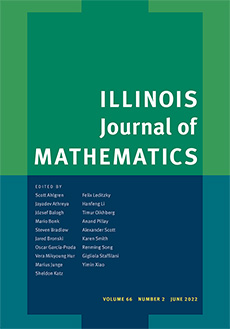Abstract
The following well-known perturbation theorem is of fundamental importance in semigroup theory: Let $A$ be $m$-dissipative (i.e., $A$ generates a $(C_{0})$ contraction semigroup). If $P_{1}$ is dissipative and $A$ bounded with relative $A$ bound less than one, and if $P_{2}$ is bounded, then $A+P_{1}+P_{2}$generates a $(C_{0})$ semigroup. This result is generalized to allow $A,P_{1},P_{2}$. all to depend on a real parameter $t$. Thus in many cases, establishing the well-posedness of the Cauchy problem for $$u'(t) = (A(t) + P_{1} (t) + P_{2} (t))u (t)\,\,\,\,\,\,({}^{'}=d/dt})$$ is reduced to proving the well-posedness of the Cauehy problem for $u'(t)=A(t)u(t)$. Applications are given to temporally inhomogeneous scattering, theory and to second order evolution equations of the form $$u''(t) + B(t)u'(t) + C(t)u(t) = 0;$$; here both $B(t)$ and $C(t)$ can be unbounded. Some Concrete examples are given, including mixed problems for $$u_{tt} + \alpha u_{xx} + \beta u_{x} + \gamma u_{tx} + \delta u_{t} + \varepsilon u + \phi$$ with time dependent boundary conditions; here all the coefficients are smooth functions on $$\left\{{(t,x): - \infty < t < \infty ,\,0 \leqslant x \leqslant 1} \right\}$$, $\alpha$ is positive and $\gamma$ is sufficiently small.
Citation
Jerome A. Goldstein. "A perturbation theorem for evolution equations and some applications." Illinois J. Math. 18 (2) 196 - 207, June 1974. https://doi.org/10.1215/ijm/1256051221
Information





